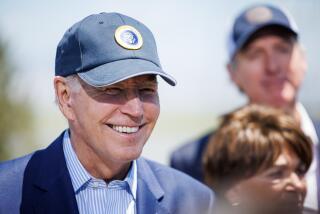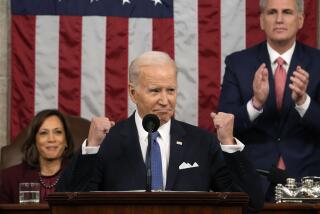Obama channeling Reagan? Let’s hope not
Time magazine’s cover this week features a Photoshopped picture of Ronald Reagan with his arm around President Obama. The cover story purports to answer the question of why Obama is channeling Reagan, a question no one was asking until Time brought it up. It’s a standard newsmagazine technique to add a “why” to the thesis of a story. It makes it seem deeper, even while skipping over the hard part of whether it’s true.
If Obama is attempting to emulate Reagan, there is no mystery about why. Reagan carried 49 states in 1984, the year he was reelected. But Time contends the 44th president is following the example of the 40th in some unusually profound way.
I hope that’s not true. Reagan was a nice enough man — but a terrible president. I know, I know, you’re not supposed to say this. Even political opponents are supposed to recognize and applaud his sunny disposition, his death grip on various bromides, his mystical connection with the voters, the wisdom in his simple view of a complicated world and so on. I am unpersuaded.
This is Reagan’s centennial year. Ten years ago, on his 90th birthday — when he was still alive — I attempted to summarize the case against his presidency in a pair of articles for Slate.com. You can read the result here (domestic policy) and here (foreign policy) and decide for yourself.
But the notion that Obama is following Reagan’s example, though a characteristic newsmagazine conceit, is new. Where is the evidence? Time says it is “under the surface.” Also “less substantive than stylistic and instinctive.” That’s for sure.
Time offers three kinds of evidence that Obama is following Reagan’s path. First are quotes from various folks endorsing the proposition. Like this one: “Obama is approaching the job in a Reaganesque fashion,” says hyper-historian Douglas Brinkley. And this man once had dinner with the president, so he should know. Trouble is, Doug Brinkley could out-amiable the Gipper himself. If you called him up, said you were calling from Time and working on a story about how half the Senate was secretly born on Mars, he would give you a confirming quote.
The article also cites a tweet from White House Press Secretary Robert Gibbs over Christmas about how Obama was reading a Reagan biography. Of course, if Time, even with its dwindling circulation and influence, wants to compare your boss to Ronald Reagan, why not help?
The second kind of evidence is coincidences on the order of “JFK had a secretary named Lincoln and was shot in a Lincoln, made by Ford, and Lincoln was shot in Ford’s Theatre,” and so on. Did you realize that both Obama and Reagan advocated large defense cuts in their second State of the Union addresses? That both called for simplifying the tax code?
Whatever he may have said in his second State of the Union speech, Reagan was obviously not a man for cutting the defense budget. As for tax reform, it was a defensive response to criticism that his tax cut the previous year had been too kind to the well-to-do. Obama, who also has displayed little interest in tax simplification, threw it into the stew to allay critics saying he was too tough on the well-to-do.
The third category of evidence is noncoincidences: actions and remarks so general or unobjectionable and so commonplace that they could be used to tie any president to any other. Reagan once said, “Let us … concentrate on the long-range, bipartisan responsibilities of government.” Obama has “made compromise his new watchword.” Obama wrote of Reagan that he “recognized the American people’s hunger for accountability and change.” Never mind that bipartisanship was never a big Reagan theme. Nor was compromise ever his watchword, nor accountability, nor change.
Reagan ran for president promising smaller government and a balanced budget. When he left office, federal spending was 25% higher and the federal workforce was no smaller. Worst of all, Reagan, with his sunny disposition amid catastrophe, taught Americans that it will all be OK; don’t worry about it. So for 30 years we didn’t worry about it. Now we’re worried. But it’s a little late. I don’t call that greatness, or worth emulating.
Michael Kinsley, a former editorial page editor of The Times, writes a column for Politico.
More to Read
A cure for the common opinion
Get thought-provoking perspectives with our weekly newsletter.
You may occasionally receive promotional content from the Los Angeles Times.






